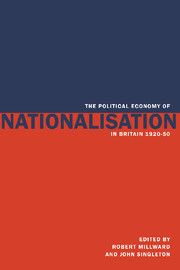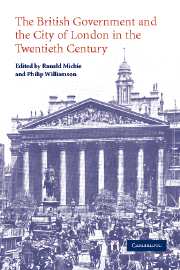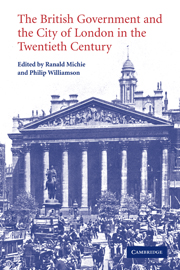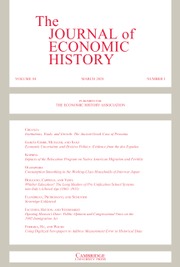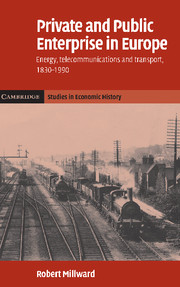The Political Economy of Nationalisation in Britain, 1920–1950
In this study of the causes of nationalization, experts in British industrial history analyze the public ownership debates. During the Labour governments of 1945-51 a number of important industries were taken into public ownership, and legislation was passed for the nationalization of the steel industry. It was argued that nationalization would lead to an improvement in the efficiency of these key sectors, on which the rest of British industry depended for inputs.
- Written by a team of experts on economic and industrial history
- Examines a key issue in the economic history of Britain in the twentieth century
Reviews & endorsements
"The case for this volume is almost too obvious to need stating...These up-to-date essays will therefore receive an unequivocal welcome from students and scholars....But no short review of this kind can do justice to the range and depth of these essays; they will give students of both economic and political history plenty to think about for some years to come." Historian
"...the papers have some considerable strengths." Journal of Economic History
"The papers, written largely by specialists in the industries concerned, are of high quality and accurately reflect the variety of industrial circumstances and accidents that did or did not result in nationalization when Labour came to power in the summer of 1945. The collection as a whole makes an essential, thought-provoking addition to undergraduate and graduate libraries." D.E. Moggridge, Choice
"...an outstanding and informative collection in which every essay is pertinent, the standard uniformly high, the themes clear, the research solid, and the conclusions pointed and satisfying." Kenneth D. Brown, Albion
"The case for this volume is almost too obvious to need stating. The nationalization of British industry has been a surprisingly neglected theme...These up-to-date essays will therefore receive an unequivocal welcome from students and scholars...But no short review of this kind can do justice to the range and depth of these essays; they will give students of both economic and political history plenty to think about for some years to come." The Historian
Product details
April 2002Paperback
9780521892568
340 pages
229 × 152 × 19 mm
0.5kg
27 tables
Available
Table of Contents
- Part I. Government and Industry 1920–50:
- 1. Industrial organisation and economic factors in nationalisation Robert Millward
- 2. Labour, the Conservatives and nationalisation John Singleton
- Part II. Case Studies of Industry Organisation, Performance and Nationalisation:
- 3. The coal industry: images and realities on the road to nationalisation David Greasley
- 4. The changing role of government in British civil air transport 1919–49 Peter Lyth
- 5. The motor vehicle industry Sue Bowden
- 6. The railway companies and the nationalisation issue 1920–50 Gerald Crompton
- 7. The motives for gas nationalisation
- practicality or ideology John F. Wilson
- 8. Public ownership and the British arms industry 1920–50 David Edgerton
- 9. The water industry 1900–51: a failure of public policy? John A. Hassan
- 10. Debating the nationalisation of the cotton industry, 1918–50 John Singleton
- Part III. Government and the Process of Industrial Change in the 1940s:
- 11. 'The thin edge of the wedge?': nationalisation and industrial structure during the Second World War Peter Howlett
- 12. The political economy of nationalisation: the electricity industry Martin Chick
- 13. Partners and enemies: the government's decision to nationalise steel 1944–48 Ruggiero Ranieri
- Part IV. Review and Conclusions:
- 14. The ownership of British industry in the post-war era: an explanation Robert Millward and John Singleton
- Index.

